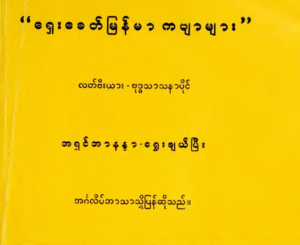Min Thu Wun – “The Pyinma Stump”
Lagerstroemia Flos Reginae (1949) Translated by G.H. Luce
In this hauntingly beautiful poem, Min Thu Wun breathes life into a battered Pyinma stump—gnarled, twisted, and scarred by time and turmoil. It stands like a naked vulture on a mound, its roots coiled and cracked, its body ravaged by ants, termites, blades, and storms. Yet, despite the decay and the relics of war embedded in its bark, the stump remains unbowed.

The poet’s imagery is visceral:
“Sunk in cranny / Near the summit, / Lies a helmet / Wan and scrawny, / Dented, broken / … a sure token / War was here!”
But this is not a lament. It is a hymn to resilience. The Pyinma, though dwarfed and wounded, is not defeated. As summer returns and warm winds stir, the old stump prepares to cast off its dead leaves and burst forth anew. It is a metaphor for hope, for rebirth, for the indomitable spirit that survives even the harshest trials.
“Thou from ruin / Shalt renew thy / Youth of beauty! / Hero! Thou!”
Min Thu Wun’s Pyinma echoes the ancient promise found in the Book of Job:
“For there is hope for a tree, if it is cut down, that it will sprout again… at the scent of water it will bud and bring forth branches like a plant.” —Job 14:7–9 NKJV

This poem is not merely botanical—it is political, spiritual, and deeply human. It speaks to all who have been broken, buried, or burned, yet still believe in the possibility of renewal.








